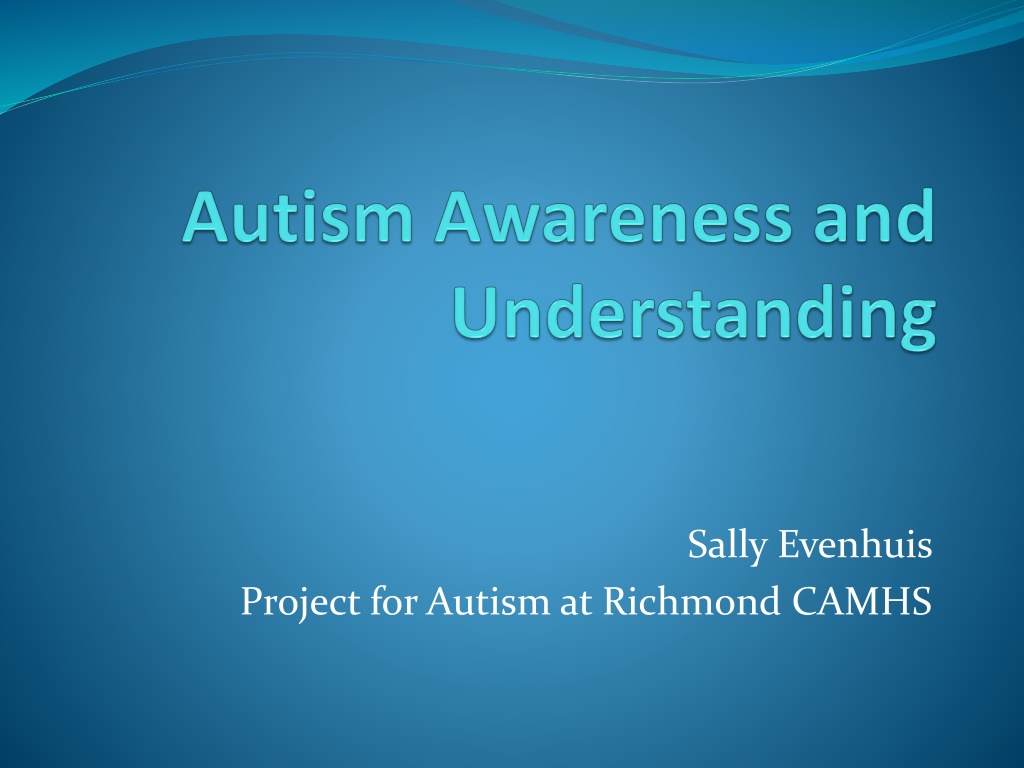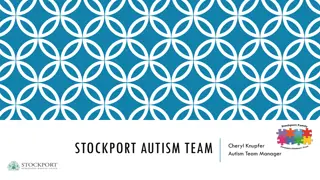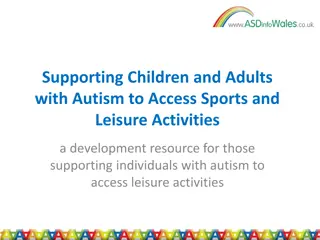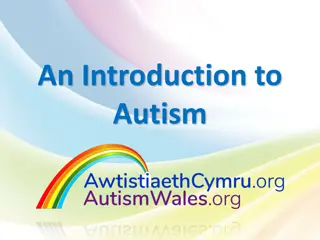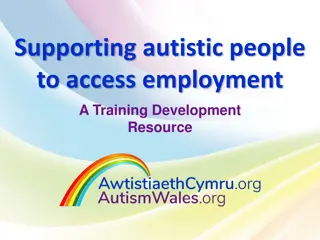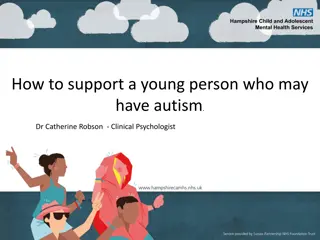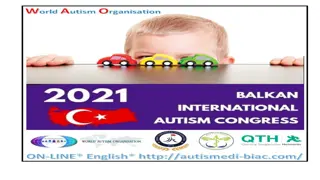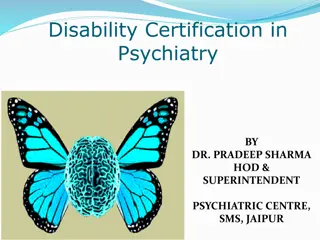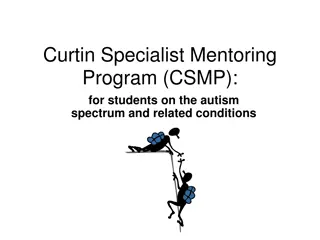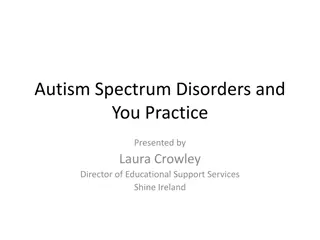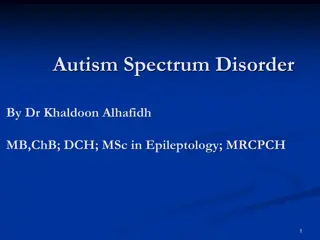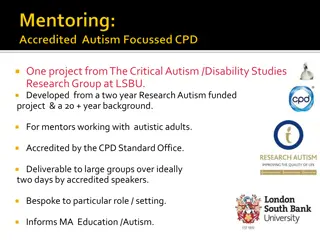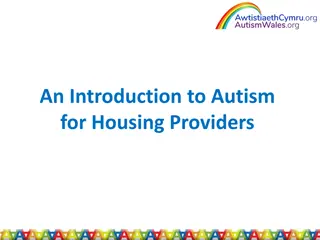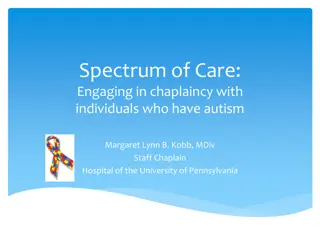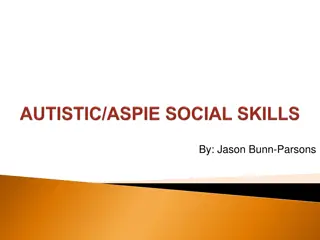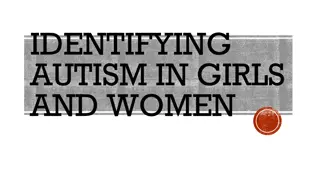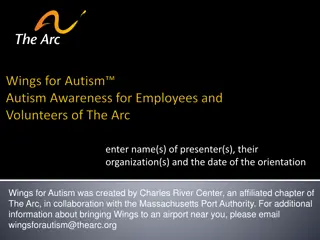Understanding Autism: A Comprehensive Overview
Autism, a lifelong developmental condition, affects how individuals communicate and interact with the world. It is a spectrum disorder with unique traits and challenges in communication, social interaction, and flexibility of thought. Learn more about the core features of autism and dispel common misconceptions surrounding the condition.
- Autism Spectrum Disorder
- Neurodevelopmental Condition
- Communication Challenges
- Social Interaction
- Flexibility of Thought
Download Presentation

Please find below an Image/Link to download the presentation.
The content on the website is provided AS IS for your information and personal use only. It may not be sold, licensed, or shared on other websites without obtaining consent from the author. Download presentation by click this link. If you encounter any issues during the download, it is possible that the publisher has removed the file from their server.
E N D
Presentation Transcript
Sally Evenhuis Project for Autism at Richmond CAMHS
What is Autism? Autism is a lifelong, developmental disability /difference that affects how a person communicates with and relates to other people. It affects how a person makes sense of the world and how they process information. Autism is often described as a 'spectrum disorder' because the condition affects people in many different ways and to varying degrees. http://www.autism.org.uk/about/what-is/asd.aspx
What is Autism? Lifelong Neurological condition A spectrum condition Unique to each individual Unknown cause, probable genetic link If you ve met one person with Autism you have met one person with Autism. Stephen Shore Author and adult on the Spectrum
Autism is not Autism is NOT caused by refrigerator parenting Autism is NOT a learning disability People with every measure of IQ can have autism , but people with autism are likely to have areas of skill and areas of challenge Autism is NOT a mental health problem
Core Features of Autism challenges in these three areas Communication Social Interaction Flexibility of Thought
Social Interaction Traits Unmotivated to communicate with others / little interest in other people Anxiety around socially interacting / meeting new people May make little or no direct eye contact Difficulty being in groups or crowded places May prefer being on own than around others
Flexibility of Thought Traits Difficulty with unexpected change, prefers routine Difficulty with seeing things from another persons point of view Detail focused difficulty in seeing the bigger picture Special interests may not be age or socially appropriate
Communication Examples Literal understanding difficulty with sarcasm / phrases Often direct and too honest May communicate very little or dominate conversations Communication may be off topic , repetitive or focus on areas of interest
Positives of autism People with autism often have one or more of these qualities : Don t tend to lie Good memory for dates Honest Don t judge Can focus and excel in a specific field Can bring up a variety of interesting facts Great attention to detail Have one or more highly developed talents Are easily able to forgive others
Autism Stars Satoshi Tajiri ; the creator of Pok mon Heather Kuzmich model Chris Packham ;TV presenter How about Lionel Messi ? Einstein?
Disability or Difference ? Autism can be described as ASD (Autism Spectrum Disorder) or ASC (Autism Spectrum Condition ) What are the advantages and disadvantage of each title? The world needs different kinds of minds to work together Temple Grandin
Challenges of living with autism Neuro divergent in a neurotypical world The label leads to presumptions that you may be a genius or have a learning disability Sensory issues are almost always a major issue and can make life hard to tolerate if not accommodated https://www.youtube.com/watch?v=K2P4Ed6G3gw
The Neurological Umbrella A diagnosis of ASD rarely exists in a vacuum. People with autism often have other co-occurring diagnoses, for example Dyslexia Speech and language difficulties Executive functioning difficulties ADHD Dyscalculia Dyspraxia Sensory integration difficulties Autism OCD Anxiety/Depression
Literal Understanding Back in a second! Canyou hang on ? Jump on the computer! People with ASC may find it difficult to understand and interpret unwritten rules of social interaction. People with an ASC often have to work at learning these rules. It can often be confusing and cause anxiety as many social rules are unwritten and not spoken about it.
Routine and change In order to make the world a less confusing place, people with ASC may have rules and rituals (morning rituals, ways of doing things) which they can reply upon. They may prefer to order their day to a set pattern or routine. But this can cause anxiety if something goes wrong in their daily routine e.g. bus is late
Processing delay Some people with Autism have difficulty processing information straight away. So may need that extra time to process information. Solutions- Quiet environment = minimal distractions. Communicate one thing at a time Provide written information to back up verbal
Seeing the world in detail When I go out in the world, I notice everything, and mentally process everything. And I mean everything. This is partly why I get so exhausted Kirsten Byrd She will see things in the distance that nobody else will notice, until she points them out for them. She can really see the detail in things Alis Rowe
